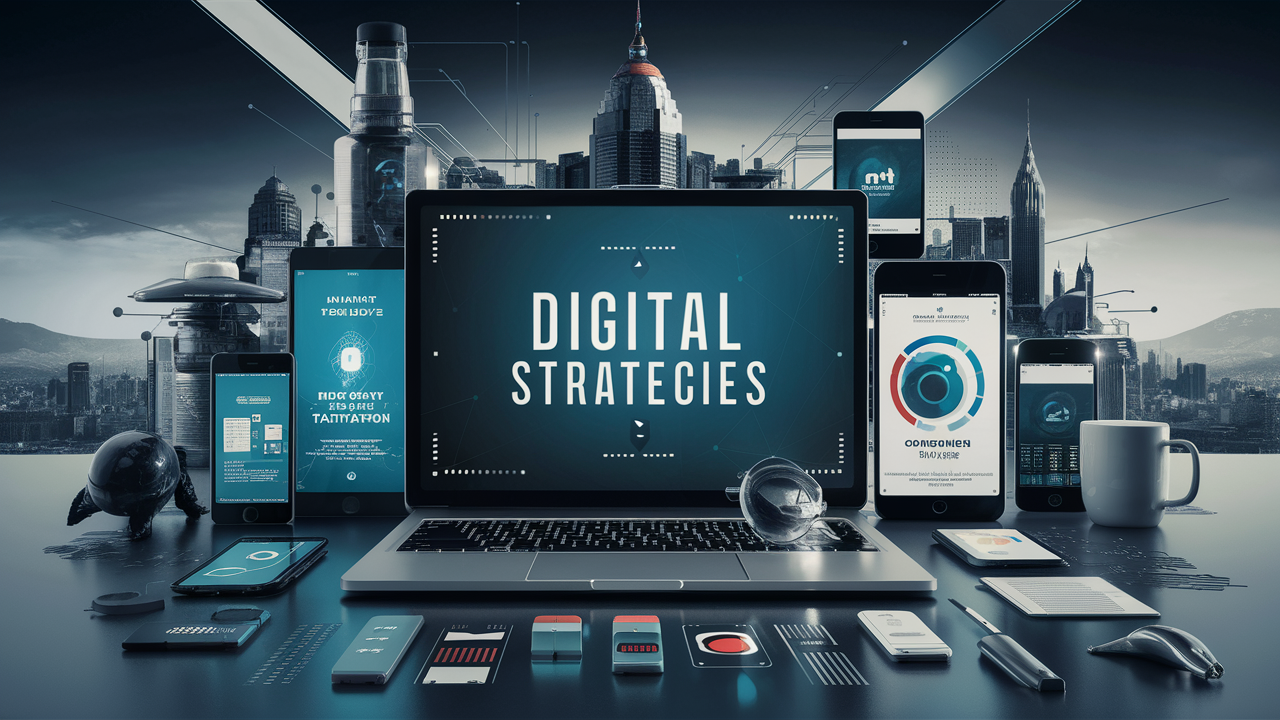Looking ahead to 2024, it has never been more important for companies to implement efficient digital strategies.
The Biggest Bottlenecks for Companies’ Digitalization Efforts
In a Forbes article, Ioana Dragomir examines the essential ongoing role of digital transformation in business strategy, underscoring it’s no longer a finite project but a cornerstone of growth. She emphasizes the need for managers in all sectors to be familiar with technologies such as large language models and to bring their technical expertise beyond the IT departments into all areas of company management.
Dragomir notes that with the digital transformation market booming, projected to exceed $1 trillion by 2025, adopting new technologies is critical for competitive resilience. She also reflects on the World Economic Forum’s Future of Jobs Report 2023, suggesting a tech-driven net job increase but cautions that nearly half of current skill sets may become obsolete, prompting a need for substantial reskilling.
Ultimately, Dragomir champions a digital strategy that not only embraces technological progress but also prioritizes employee upskilling and a culture of lifelong learning. Proactive leadership, regular reviews of tech’s business impact, and a commitment to workforce development are vital to thrive in the digital era.

Observations from our daily practice as a digitalization partner
Giving the article is a very good starting point, we would like to add our observations to it, which we are collecting in our everyday work with our clients and partners.
Outdated Processes Persist
Despite the rapid advancements in technology, many businesses continue to rely on outdated processes that hinder their efficiency. From manual data entry to fragmented communication channels, these practices are not only time-consuming but also prone to errors.
During our client interactions at Arckipel, we frequently encounter companies struggling with legacy systems that lack integration capabilities. This often results in duplicated efforts and data silos, complicating decision-making processes.
Moreover, the reliance on paper-based workflows further exacerbates inefficiencies, making it difficult to track progress and ensure accountability.
Inefficiencies in Workflow
Inefficiencies in workflow are a common challenge we observe among our clients. These inefficiencies often stem from a lack of standardized procedures and insufficient automation. For instance, many companies still rely on manual approvals and paper-based documentation, which can slow down critical processes and lead to bottlenecks. Additionally, the absence of real-time data sharing and collaboration tools further hampers productivity, as team members spend valuable time searching for information or clarifying tasks.
Inefficient workflows not only delay project timelines but also increase operational costs, making it difficult for businesses to scale effectively.
Uncertainty in Digital Investment
At Arckipel, we’ve noted that while there’s a general eagerness to embrace digital transformation, many companies are navigating this transition without a clear roadmap. They recognize the need to invest in digital advancements, yet grapple with understanding what effective digitalization truly entails.
The spectrum of digitalization encompasses a vast array of possibilities, including leveraging artificial intelligence (AI). Without deep insights into the available technologies and strategies, decision-makers might feel like they’re making choices without any guidance, akin to groping in the dark.
Trust Challenges with Digitalization Vendors
A significant burden rests on the shoulders of digitalization agencies, as trust emerges as a prominent challenge. Too often, some agencies capitalize on market dynamism by demanding exorbitant fees while offering minimal real engagement or substantial results.
A growing chorus of clients have expressed their disillusionment to us, revealing feelings of exhaustion, dissatisfaction, and a sense of betrayal from previous experiences with such firms. It underscores an urgent industry imperative for transparency, co-investment in success, and genuine partnership – qualities that clients find refreshingly different and reliable when they turn to us at Arckipel.
What we can advise at Arckipel
At Arckipel, we guide companies through the essential steps for successful digitalization, leveraging our extensive experience across diverse industries.
Here are our top 5 strategic non-tech recommendations, refined to emphasize the importance and impact of a holistic digital strategy:
-
Adopting a Holistic Approach to Digitalization: Rather than addressing isolated issues, developing an overarching digital strategy is key to transformative success. This comprehensive approach ensures that all aspects of your business are aligned with digital advancements, leading to more impactful outcomes.
-
Embracing Change Openly: Many organizations cling to traditional workflows due to familiarity and perceived stability. However, to truly benefit from digital opportunities, companies must be willing to embrace new methodologies, even when they disrupt conventional practices.
-
Overcoming Tech Intimidation: A common barrier to digital adoption is the fear of not being able to master new technologies, especially complex ones like AI. It’s crucial for digital solution providers to develop intuitive, user-friendly systems that allay these fears. At Arckipel, we focus on making technology accessible and easy to use, restoring confidence in digital tools.
-
Efficient and Cost-effective Implementation: The misconception that digital transformation is always expensive and time-consuming prevents many from pursuing it. However, the reality is that with the right expertise and technology, digital solutions can be implemented swiftly and economically. We help our clients see that digital transformation can be both affordable and efficient.
-
Adapting to Organizational Complexity and Rapid Technological Changes: Even in complex corporate structures or industries where technology evolves rapidly, effective digital systems can be designed to adapt and grow with the organization. The key is implementing flexible solutions that can accommodate ongoing changes without disrupting existing operations.
By focusing on these five points, companies can not only modernize effectively but also ensure that their digitalization efforts are sustainable, enabling continuous growth and innovation in an increasingly digital marketplace.
Core Technological Solutions We Employ in Our Digitalization Efforts
In our recommendations for digitalization, we emphasize the integration of advanced technologies to enhance operational efficiency and user experience:
Internet of Things (IoT) Integration: IoT is pivotal for enabling remote monitoring and management. For example, Solucalc could leverage IoT to allow remote monitoring and management of water softening systems, enhancing operational efficiency and proactive maintenance.
-
Data Analytics: This technology plays a crucial role in understanding and optimizing resource use, analyzing business trends, and customer behaviors. It enables companies to make data-driven decisions that streamline operations and enhance customer experiences.
-
Customer Engagement through Mobile Apps: Mobile apps enhance user interaction and satisfaction by providing users with easy access to manage their systems and engage with services on-the-go, transforming customer service paradigms.
-
Customizable Modules within Business Software: Offering tailored solutions that cater to specific operational needs, customizable modules increase the software’s flexibility and utility, allowing businesses to adapt quickly to changing requirements.
-
Cloud Integration and Multi-Platform Accessibility: Ensuring that applications are accessible across various devices and platforms is essential for today’s mobile and flexible working environments. This integration supports seamless collaboration and data access regardless of location.
-
Artificial Intelligence (AI) and Machine Learning (ML): These technologies are crucial for automating complex processes, providing predictive analytics, and enhancing decision-making capabilities. AI and ML can transform vast amounts of data into actionable insights, improving efficiency and strategic planning.
-
Cybersecurity Solutions: As digitalization increases, so does the risk of cyber threats. Implementing robust cybersecurity measures is essential to protect sensitive data and maintain trust in digital systems.
-
Automation and Robotic Process Automation (RPA): Automation of repetitive tasks frees up valuable human resources for more strategic activities, improving productivity and reducing errors.
By considering these core technologies, companies can significantly boost their digital capabilities, offering more personalized, secure, and efficient solutions to meet the evolving demands of their markets.
Forward-Looking Digital Strategy Outlook for Sustained Business Growth in 2024
In 2024, the infusion of efficient digital strategies into business operations is not merely beneficial; it’s imperative for sustained growth. As Ioana Dragomir writes in Forbes, digital transformation goes beyond a single initiative and has become a mainstay for emerging businesses.
Entering the digital world brings challenges such as outdated processes, hesitation to invest digitally and doubts about the credibility of providers.
At Arckipel, we recognize these issues and advocate for a digital framework that fits into a company’s core processes. The willingness to embrace change should be instinctive to create an environment that enables continuous evolution.
We simplify technology and offer intuitive solutions that are equally suitable for all skill levels and take away the fear of new systems.
With our expertise, digitalization can happen quickly and economically. We enable companies to remain agile, with strategies that evolve at the pace of technological innovation, ensuring resilience and responsiveness.
With these principles, companies can embark on a digital journey that is as sustainable as it is progressive, laying the foundation for constant evolution and innovation as we evolve.
Connect with Us for Digital Transformation Solutions
Ready to elevate your business with a robust digital strategy?
Follow us on LinkedIn and Twitter to stay updated on how we’re transforming businesses.
Contact us to let Arckipel guide you through a seamless digital transformation that aligns with your goals and industry standards.
Let’s turn your digital challenges into opportunities for growth and innovation.





1 Comment
Comments are closed.